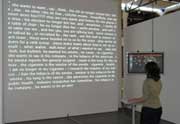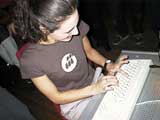David Link‘s Poetry Machine 1.0 is a word processor that generates texts through a combination of user input and autonomous web bots. Its sources of information are the gigantic pools of information on the Internet.


In a room, a text that is written by nobody runs on a projection screen. The keys of the keyboard move swiftly as if by a ghost’s hand and a mechanical voice reads out the generated text, sentence by sentence.
But when visitors approach, the text generator staggers, hesitates, at times grows completely silent. If a visitor strikes the keys himself, the text appears on the screen as well.
If the user’s input contains words that are unknown to Poetry Machine, the program sends “bots” into the internet to get appropriate informations. Their search process (visited sites, their valuation and the documents found) can be followed on a second screen.
In this interaction of machine words and human text, «Poetry Machine» creates a new écriture automatique, where language is no longer the exclusive domain of human thought but also that of the internal logic of computers.
The work is part of the Beijing International New Media Arts Exhibition and Symposium, June 30 – July 10 2006, China Millennium Museum, Beijing. Images.


Writing about uncanny keyboard, gives me a great opportunity to mention Crispin Jones‘s Electrophile, a keyboard designed for celebrity fans who have limited means for communicating the fandom through email messages. The keys on this tool for adding a sense of devotion to email messages are fitted with tiny metal contacts that deliver an electric shock to users. The shock becomes progressively stronger as more characters are entered. You’ve got to be a real fan of the celebrity to finish your letter to him/her. The shocks are controlled by a circuit based on one which was designed for a muscle toning device (“Gym Relax”).
